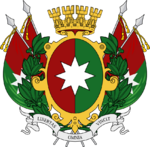Years of Lead (Aucuria)
This article is incomplete because it is pending further input from participants, or it is a work-in-progress by one author. Please comment on this article's talk page to share your input, comments and questions. Note: To contribute to this article, you may need to seek help from the author(s) of this page. |
| Years of Lead | |||||||
|---|---|---|---|---|---|---|---|
| Part of the Great Game | |||||||
| |||||||
| Belligerents | |||||||
|
• Aucurian Army • Aucurian Navy • Aucurian Air Force • National Guard • National Police • National Intelligence and Security Agency Supported by: Right-wing extremists • tbd |
Left-wing insurgents • • tbd other leftists • • tbd other indigenists • tbd pan-bahians Supported by: | ||||||
| Commanders and leaders | |||||||
|
tbd rework | Various civil society & guerrilla leaders | ||||||
| Casualties and losses | |||||||
| tbd rework | tbd rework | ||||||
The Years of Lead (Ruttish: Švino metu), also known as the Aucurian insurgency (Ruttish: Aukurijos sukilimas) or the Dirty War (Ruttish: Purvinas karas), was a period of protracted insurgency and state terrorism in Aucuria, generally considered to have lasted from 1949 until 1974.
The Years of Lead began shortly following the 1949 Aucurian coup d'etat, in which President of Aucuria Adrianas Volpis was deposed, murdered, and replaced by General Albertas Kalvaitis. The newly-installed Kalvaitis regime subsequently unleashed a wave of terror upon left-wing, indigenous, and minority groups, some of whom took up arms against the regime... [severe human rights abuses, '64 Sugar Crash provokes escalation] ...A highly coordinated and ruthless push by President Martynas Sprogys, combined with the economic prosperity of the Sugar High, caused the insurgency against the regime to largely fizzle out by 1974, though smaller-scale activity continued through the 1970s.
The brutality of the state terrorism undertaken by the Aucurian regime during the Years of Lead provoked deep resentment among much of the Aucurian public, and was one of the factors in the outbreak of the Velvet Revolution, which deposed the ruling military clique, in 1979. Following the Velvet Revolution, many individuals responsible for atrocities during the Years of Lead were tried and found guilty of war crimes and crimes against humanity and subsequently jailed.
